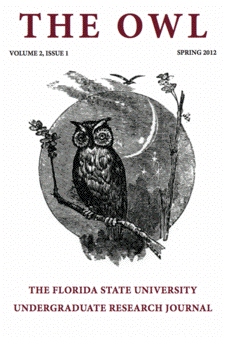Play in Wild, Immature White-Faced Capuchins
Keywords:
Theory of Evolution, animal behavior, Latin AmericaAbstract
Play is a costly and sometimes dangerous behavior found in most mammals and many birds and proves something of a challenge to explain in evolutionary terms. Theories on the evolution of play suggest that it imparts some benefit that exceeds the costs associated with the behavior. This study examines the relative rates of different types of play in a population of wild, sub-adult whitefaced capuchins a small, arboreal monkey, in northeastern Costa Rica. This species in particular is
known for being manually dexterous and highly manipulative foragers. The purpose of this study is to investigate the possibility of a link between these skillful mature behaviors and early learning obtained through play in sub-adults.
Downloads
Published
Issue
Section
License
All works published in The Owl are published under a Creative Commons Attribution, Non-Commercial, Share-Alike (CC-BY-NC-SA) license. The author retains copyright.

